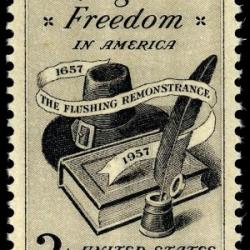Ed Brayton flagged this article reporting on one of the dumbest legal arguments ever put forward by advocates of privilege for majority religions: “Giles School Board’s lawsuit defense: Somebody else hung Ten Commandments.”
When the [Giles County, Va., school board] voted 3-2 to allow an exhibit of the Ten Commandments and historical documents in county schools, it did so with the understanding that a private citizen would actually put up the display, attorneys for the board argued in court papers filed this week.
No public funds were devoted to the display, the board maintained, nor did any school employees assist in placing the exhibit at Narrows High School.
So the school board didn’t officially create and officially set up an official display promoting sectarian religion. They simply officially permitted one officially favored sectarian group of private citizens to create and hang their display in an officially sanctioned public space where it will remain officially undisturbed as a wholly unofficial expression of wholly unofficial sectarian sentiments.
This argument is doomed to get laughed out of court, but it’s notable for highlighting how the advocates of majoritarian privilege steadfastly refuse to ever try to see the world through others’ eyes. They seem incapable of shoe-on-other-foot thinking — of ever asking, “Would I think that was fair if someone else did that to me?”
They are, in other words, thoroughly unprincipled. That’s what unprincipled means. It means never asking, “Would I think that was fair if someone else did that to me?”
Just imagine that a private citizen from Giles County, using no public funds, and with no assistance from school officials, hung a display honoring the Five Pillars of Islam as the cornerstone of all morality. How would the school board respond, do you think?
Also from Brayton: “A Catholic theocrat in Texas” (John Courtney Murray, please call the office.)
– – – – – – – – – – – –
Rabbi David Saperstein and Buzz Thomas offer “Five Rules for Faith and Politics.”
1. It is never appropriate — explicitly or implicitly — to impose a religious test for public office.
2. Religious leaders should refrain from using religious authority or threats to coerce the political decisions of American citizens or candidates.
3. Candidates should refrain from citing religion as the exclusive authority for their position on issues.
4. Politicians should try to be inclusive of all citizens when — in their public capacity — they choose to speak religiously.
5. Religious organizations have the constitutional freedom — and we would argue moral duty— to speak out on the great issues that confront our nation, but as tax-exempt entities they should never endorse or oppose candidates for public office.
For a longer discussion of those five points, see the full column.
– – – – – – – – – – – –
The column above ran in the Gannett-owned newspaper-ish publication USA Today. According to the Liberty Counsel, Gannett has launched a “War on Christmas.” Fortunately for Christmas, Liberty Counsel will be there to defend the holiday with its “Ninth Annual ‘Friend or Foe Christmas Campaign.'”
The Liberty Counsel is a conservative activist group that describes its goal as “restoring the culture by advancing religious freedom, the sanctity of human life and the family.” By “religious freedom” they mean what David Barton and Bryan Fischer mean when they counsel such liberty — the privileging of political Christianity as the official religion established by the Founding Fathers and the only sect guaranteed the right of free exercise.
Liberty Counsel’s main approach to “restoring the culture” seems to be the usual tactic of selling useless stuff to gullible people and soliciting donations with scary stories, fabrications and exaggerations. Among the items Liberty Counsel sells is the $15 “Help Save Christmas Action Pack.” Because the only way to save Christmas is with your “‘I Love Christmas’® vinyl static cling window decal,” and your “‘I Love Christmas’® button and bumper sticker,” your sample newspaper ad and your copy of “‘The Memo that Saved Christmas’ — two legal memoranda about Christmas in public and in the workplace.”
The editor of the Livingston (Mich.) Daily, a Gannettified newspaper, called out the Liberty Counsel on this “War on Christmas” silliness, accusing them of dishonest hucksterism. The Liberty Counsel’s response was, of course, more dishonest hucksterism in the form of a press release declaring “Gannett-Owned Media Launches War on Christmas” and urging Christians to rally to the holiday’s defense by purchasing plenty of Help Save Christmas Action Packs for just $15 (plus shipping and handling).
As a former Gannett employee I’m amused by Liberty Counsel’s concern that the layoff-addicted publisher is a serious threat to something other than the future of journalism. A supposed Gannett-launched “War on Christmas” isn’t nearly as frightening a thought as, say, a Gannett takeover of Christmas. Then we’d end up with Nativity scenes featuring no baby Jesus — just Mary, one shepherd and an unpaid intern replacing all three wise men. (Nonsectarian version: Then Santa would be forced into early retirement and we’d have an unpaid intern flying a sleigh pulled by three overworked reindeer.)
Anyway, the important thing to remember is that the Liberty Counsel has apparently copyrighted the phrase “I Love Christmas®.”
I’m not sure how legally binding that copyright is, but just to be on the safe side, we should all try to avoid using that phrase or anything close to it, such as “Merry Christmas.” So this December we should all just make the Liberty Counsel happy and stick to “Seasons Greetings” or “Happy Holidays.”












